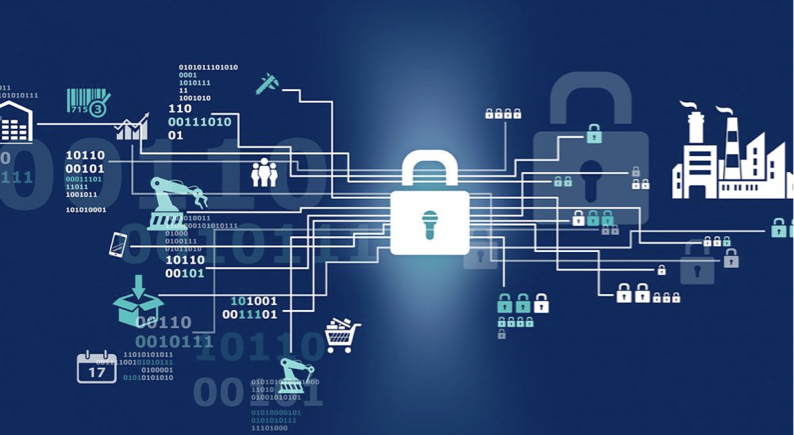Table of Contents
Home / Blog / Blockchain
How Blockchain Enhances Data Privacy and Security in Businesses?
December 13, 2023

December 13, 2023
In today’s digital age, data privacy and security have become a critical concern for businesses of all sizes. Businesses face escalating challenges in maintaining data privacy due to evolving cyber threats and increased reliance on digital platforms. Data breaches, unauthorized access, and third-party exploitation pose significant risks, highlighting the pressing need for robust solutions.
Traditional data security measures often rely on centralized systems and encryption techniques, which can be vulnerable to breaches and manipulation. Blockchain technology, however, offers a revolutionary solution to these challenges.
As a distributed ledger technology, blockchain provides a decentralized and immutable record of data transactions, making it highly resistant to unauthorized access and alteration. This, coupled with its inherent transparency and cryptographic security features, has the potential to transform the way enterprises manage and secure their data.
This blog will explore how can a blockchain development company help tackle data privacy and security issues for businesses, highlighting its key benefits and potential impact across various industries. We will delve into the specific features of blockchain technology that contribute to enhanced data security and user privacy, and discuss the challenges and considerations that need to be addressed for wider adoption. By the end, you will gain a complete understanding of how blockchain can empower businesses to protect their data and create a more secure digital environment.
How Blockchain Tackles Businesses’ Data Privacy Concerns?
Blockchain technology is revolutionizing the way businesses handle data privacy. Let’s explore how it does this in a simple and easy-to-understand way.
- Decentralized Architecture:

The centralized nature of traditional data storage systems creates a single point of failure, making them vulnerable to breaches and manipulation. Conversely, blockchain technology’s decentralized architecture offers a significant advantage. Data is distributed across a network of computers, known as nodes, eliminating the reliance on a central authority. This decentralization has several key benefits:
- Reduced vulnerability to attacks:
With no single point of failure, attackers face a significantly more challenging task in attempting to breach the network. This makes data stored on the blockchain more resilient to cyberattacks and data breaches. - Increased transparency and trust:
As data is accessible to all participants in the network, it fosters transparency and accountability. This transparency allows stakeholders to verify the integrity of data and track its usage, building trust in the system. - Enhanced user control:
Individuals have greater control over their data in a decentralized system. They can also choose who has access to their information and how it is used. This empowers users and promotes individual data privacy.
You May Like To Read: Blockchain Integration Revolutionizing Leading Businesses
- Encryption and Cryptography:
Blockchain employs robust encryption techniques to secure data at rest and in transit. These techniques ensure that only authorized users can access and decrypt sensitive information. The following key features contribute to data security:
- Data immutability:
Data stored on the blockchain is immutable, meaning it cannot be altered or deleted without consensus from the network. This protects data from unauthorized modifications and ensures its integrity. - Cryptographic hashing:
Each block on the blockchain contains a cryptographic hash of the previous block, creating a chain of interconnected blocks. This chain makes it virtually impossible to tamper with data without detection, ensuring its authenticity. - Cryptographic keys:
Users control access to their data through cryptographic keys. These keys act as digital signatures, allowing only authorized individuals to decrypt and utilize the data. This ensures that sensitive information remains confidential and secure.
- Data Ownership and Control:
In traditional systems, data ownership often resides with service providers, leaving users with limited control over their information. Blockchain empowers individuals to own and control their data in several key ways:
- Selective data sharing:
Users can grant or revoke access to their data selectively. This allows them to choose who can access their information and how it is used, promoting individual data privacy and reducing the risk of data misuse. - Data usage tracking:
Individuals can track how their data is used on the blockchain. This transparency allows them to hold organizations accountable for data breaches or unauthorized access. - Improved data portability:
Users can easily transfer their data between different platforms and applications on the blockchain. This portability gives users greater control over their information and fosters a more open and competitive data ecosystem.
- Smart Contracts:

Smart contracts are self-executing agreements programmed to work on the blockchain ledger. They automate specific actions based on pre-defined conditions, eliminating the need for manual intervention or trust in third parties. In the context of data privacy, smart contract development offers several benefits:
- Automated data access and permissions:
Smart contracts can automate the process of granting and revoking access to sensitive information. This ensures that only authorized users have access to the data, improving data security and compliance with regulations. - Compliance with data privacy regulations:
Smart contracts can be programmed to comply with specific data privacy regulations, such as the General Data Protection Regulation (GDPR). This can automate compliance processes and reduce the risk of regulatory violations. - Streamlined data sharing processes:
Smart contracts can automate the process of sharing data between different parties. This can streamline data-sharing processes and improve efficiency.
Real-World Applications of Blockchain Data Privacy and Security
Blockchain isn’t just a theoretical concept; it’s already being used in various ways to empower individuals and organizations with greater control over their data and enhance security. These use cases offer a glimpse into how blockchain is revolutionizing data privacy:
- Secure Messaging:

Imagine a world where your private messages are truly private, protected from unauthorized access and eavesdropping. Blockchain-based messaging applications are making this vision a reality. By leveraging the technology’s encryption and decentralization, these apps ensure that only intended recipients can access your messages, safeguarding sensitive communication from prying eyes.
- Secure DNS and DDoS Mitigation:
The Domain Name System (DNS) is critical for internet navigation, translating website names into IP addresses. However, traditional DNS systems are vulnerable to attacks such as poisoning and denial-of-service (DoS). Blockchain can revolutionize DNS by creating a secure and decentralized system that is resistant to these attacks. This ensures reliable internet access and protects users from malicious activity.
- IoT Security:

The Internet of Things (IoT) is rapidly expanding, connecting our homes, cities, and even our bodies to the digital world. However, the vast amount of data generated by these devices presents a significant security risk. Blockchain offers an innovative solution. By storing data on the blockchain, IoT devices can benefit from its immutability and transparent audit trails, making it virtually impossible for attackers to tamper with data or gain unauthorized access.
Related Read: Blockchain and IoT: Transforming Real-World Applications Across Industries
- Establishing the Provenance of Software:
Software vulnerabilities are a major security concern, and knowing the origin and integrity of software is critical. Blockchain can help by securely storing software provenance information, including its creators, modifications, and versions. This transparency makes it easier to identify and address vulnerabilities, ensuring the security and reliability of software systems.
- Immutable Data Storage:
Ensuring the integrity and authenticity of data is crucial for various applications, from healthcare records to financial transactions. Blockchain’s immutable ledger provides a secure platform for data storage, guaranteeing that information cannot be altered or deleted without leaving a trace. This enables verifiable data provenance and builds trust in sensitive information systems.
- Ownership Validation:
In today’s digital world, proving ownership of assets like intellectual property or digital goods can be challenging. Blockchain’s ability to track ownership transparently and immutably comes to the rescue. By storing ownership records on the blockchain, individuals and organizations can easily verify and prove ownership, reducing the risk of fraud and intellectual property theft.
Challenges and Future Trends in Blockchain for Data Privacy
While blockchain technology holds immense promise for data privacy, several challenges need to be addressed to unlock its full potential. These challenges, alongside emerging trends, will shape the future of data privacy in the blockchain space.
Current Challenges:
- Scalability and Performance:
Existing blockchain platforms often struggle with scalability, experiencing slow transaction speeds and high fees as the number of users and transactions grows. This can limit its practicality for real-world data privacy applications. - Regulation and Legal Uncertainty:
The regulatory landscape surrounding blockchain and data privacy is still evolving, creating uncertainty for enterprises and organizations considering its adoption. Clear and consistent legal frameworks are needed to guide responsible development and promote innovation. - Interoperability and Standards:
The lack of interoperability between different blockchain platforms hinders seamless data exchange and collaboration. Standardized protocols and data formats are crucial to overcome this barrier and facilitate wider adoption. - Privacy Concerns:
While blockchain offers strong security features, concerns remain regarding the potential for misuse. Balancing data privacy with transparency and accountability is a critical challenge. - Limited User Adoption:
Public awareness and understanding of blockchain technology are still relatively low, hindering widespread adoption of data privacy solutions.
Must Read: Enterprise Blockchain: Fostering Business Innovation
Emerging Trends:

- Sharding and Layer 2 Solutions:
These technologies aim to address scalability issues by dividing the workload across different partitions or separate blockchains. - Decentralized Identity (DID):
DID empowers individuals with greater control over their identity data and facilitates secure and private data sharing. - Zero-Knowledge Proofs (ZKPs):
These cryptographic techniques allow users to prove possession of information without revealing the information itself, enhancing privacy in data transactions. - Homomorphic Encryption:
This technology enables computations to be performed on encrypted data, facilitating secure data analysis and processing while preserving privacy. - Emerging Consensus Mechanisms:
Alternatives to the energy-intensive Proof-of-Work consensus mechanism, such as Proof-of-Stake, are being explored to improve efficiency and sustainability.
Future Trends:
The future of blockchain for data privacy is bright and promising. As research and development continue, we can expect to see:
- Increased Adoption: As businesses and individuals become more familiar with blockchain, its use for data privacy solutions will likely grow significantly.
- Improved Scalability and Performance: Innovations in technology and consensus mechanisms will address scalability challenges, paving the way for mainstream adoption.
- Enhanced Regulatory Clarity: Regulatory frameworks will evolve to provide clear guidance for businesses and promote the responsible use of blockchain for data privacy.
- Standardized Protocols and Data Formats: Standardized protocols and data formats will facilitate interoperability and seamless integration between different blockchain development platforms.
- Focus on Privacy-Preserving Technologies: Technologies like ZKPs and homomorphic encryption will be increasingly used to enhance privacy in data management and processing.
These emerging trends and advancements have the potential to revolutionize data privacy and empower individuals with greater control over their information. The future of data privacy lies in the hands of the blockchain community, and it promises to be a future where data is secure, private, and used responsibly.
Also Read: How To Choose A Blockchain Development Company In 2024?
Conclusion
Blockchain technology is a game-changer for businesses when it comes to data privacy and security. It offers a decentralized, tamper-proof solution that not only safeguards sensitive information but also enhances transparency and trust. As we’ve explored, blockchain has a wide range of applications, from healthcare to supply chain management, making it a valuable asset for various industries.
If you’re looking to harness the power of blockchain for your business, consider partnering with Debut Infotech, a leading blockchain development agency. They offer development services to businesses worldwide, helping you leverage this innovative technology to secure your data and build a more trustworthy future. Your data privacy and security are paramount, and blockchain is here to lead the way.
FAQs
A: Blockchain supports data privacy through its decentralized and immutable ledger. By distributing data across a network of nodes, it eliminates a central point of control, reducing the risk of unauthorized access. Additionally, blockchain employs cryptographic techniques like hashing and encryption to ensure data integrity and confidentiality. Smart contracts automate privacy agreements, further enhancing transparency and trust
A: Blockchain has versatile applications and can benefit various business sectors. It’s particularly useful in industries where data security, transparency, and trust are critical, such as finance, healthcare, supply chain, and legal services. However, its applicability depends on the specific use case and the need for a decentralized, tamper-proof ledger.
A: Blockchain enhances security against data breaches by employing cryptographic algorithms that protect data from unauthorized access and alterations. Its decentralized nature means there’s no single point of failure, making it difficult for hackers to compromise the entire system. Additionally, the transparency and immutability of blockchain transactions make it easier to detect and trace any unauthorized activities, further bolstering security measures.
Talk With Our Expert
Our Latest Insights
USA
2102 Linden LN, Palatine, IL 60067
+1-703-537-5009
[email protected]
UK
Debut Infotech Pvt Ltd
7 Pound Close, Yarnton, Oxfordshire, OX51QG
+44-770-304-0079
[email protected]
Canada
Debut Infotech Pvt Ltd
326 Parkvale Drive, Kitchener, ON N2R1Y7
+1-703-537-5009
[email protected]
INDIA
Debut Infotech Pvt Ltd
C-204, Ground floor, Industrial Area Phase 8B, Mohali, PB 160055
9888402396
[email protected]




Leave a Comment